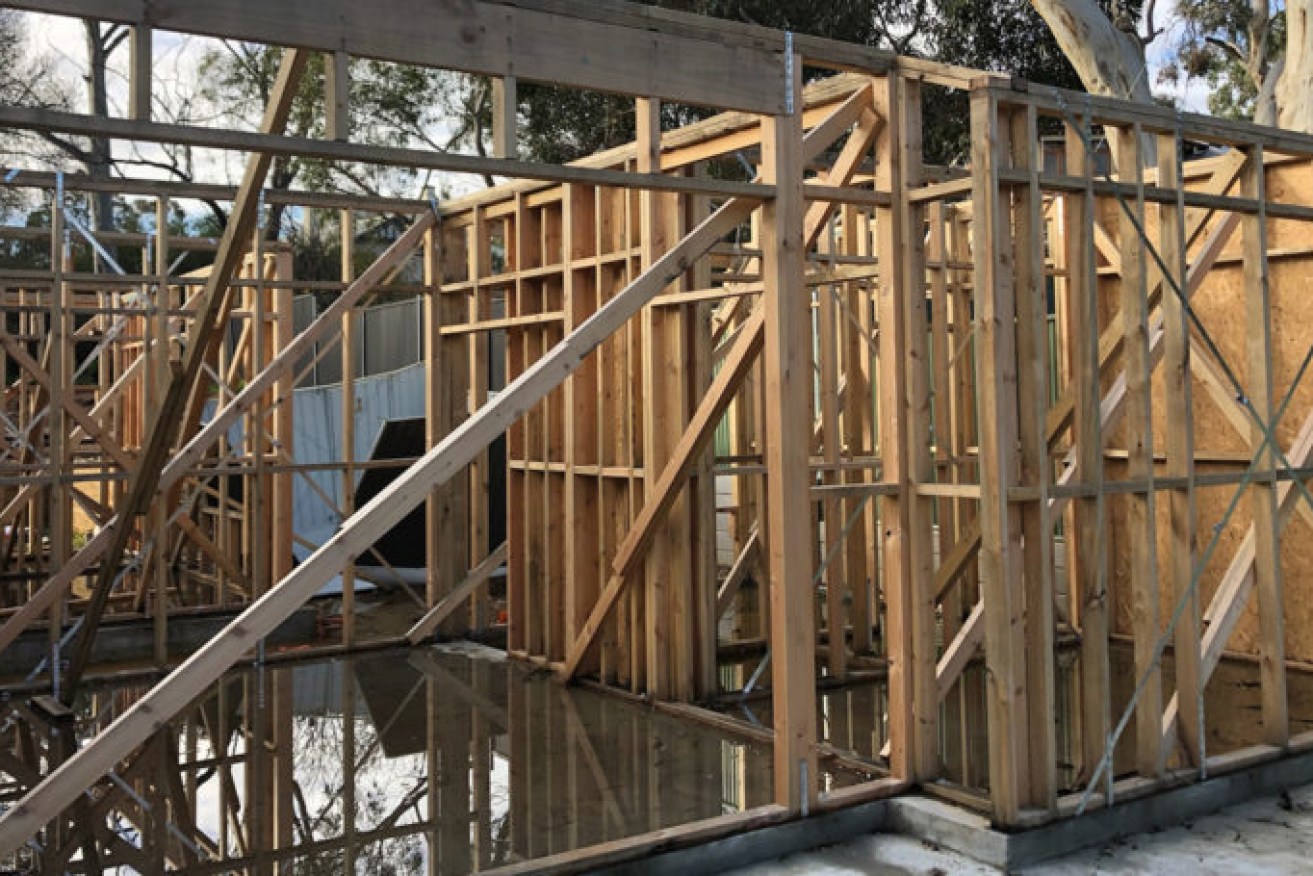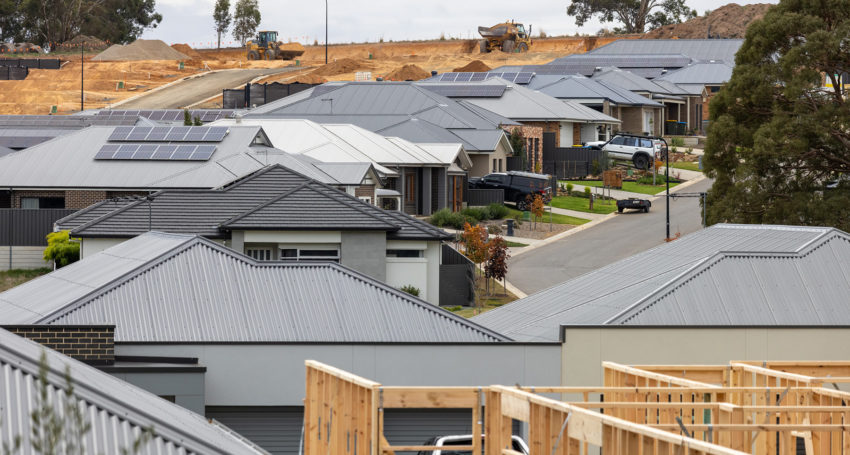Iso rules spark calls for building industry exemption
The building industry says “unfair” close contact isolation rules are stalling housing projects across the state, and is calling for exemptions applying to civil construction to be extended to residential builders.


Teams of workers being forced to isolate are stalling residential building projects cross the state.
The State Government announced exemptions for a number of industries on January 12, allowing “critical workers” to attend work despite being a close contact of a COVD-19 case.
The list of 14 industries included civil construction – but not building construction.
The Master Builders Association and Housing Industry Association have been lobbying the State Government to allow residential builders to be exempt from sitting out the full seven-day quarantine.
New home approvals in South Australia have been at near record levels for the past 18 months following the introduction of the Federal Government’s HomeBuilder scheme in June 2020.
Last year, a shortage of materials such as structural timber threatened to derail the boom and now a shortage of labour is looming as a major issue.
While many builders shut down for the Christmas holiday break, they are now looking to get back to work but cannot find concrete or carpentry teams to pour slabs and erect frames.
Master Builders SA CEO Will Frogley said the organisation had so far lobbied the Premier’s office, Treasury, SA Health and Innovation and Skills Minister David Pisoni to have building construction added to the critical workers list.
“It’s strange that they included civil construction but not building construction,” he told InDaily.
“What we’re seeing – and I think it’s going to get worse as this month goes on – is you’ve got a lot of people who are really needed on sites who feel fine and are double vaccinated but they are having to sit at home.
“Everyone was already flat out before COVID increased and as it spreads there are going to be more people who are close contacts having to sit on the sidelines when they are badly needed on sites, which will affect the build times as well.”
Most building contracts include progress payments made when certain project milestones are achieved such as the pouring of the concrete foundations.
You’ve got a lot of people who are really needed on sites who feel fine and are double vaccinated but they are having to sit at home.
Frogley said delays to work because of labour shortages meant builders would also face delays in getting paid, which would put some businesses under pressure.
“What we’re worried about is the time taken to build but also if builders aren’t able to be productive then the eventual financial impact that’s going to have,” he said.
“We’re in a different situation to retail and hospitality who have obviously got it a lot worse and the CBD is really struggling at the moment – I really feel for them. But what we’ve got is we are trying to manage a really large amount of work with reduced resources.”
The Housing Industry Australia has also been in talks with State Government on the issue.
HIA SA regional director Stephen Knight said residential construction sites had proven to be safe and worked all through the pandemic in SA apart from two short lockdowns.
“People are working outside, there are not many people on site so there is ample opportunity for separation so they are quite safe anyway,” he said.
“It’s not good timing for us because we’ve got so much demand and our jobs are taking a long time anyway because of other factors like the material shortages and the last thing we need is another reason for sites to be shut down.
“There are lots of good reasons to keep the industry working and it seems unfair that the civil sector has had this relaxation so we definitely feel strongly that particularly residential construction should have the same exemptions.”

Picture: Tony Lewis/InDaily
Knight said close contacts having to isolate often impacted entire projects with site shutdowns causing a domino effect for later stages.
“What happens is if a carpenter on a site, for example, becomes a close contact and has to isolate then automatically his apprentices have to stand down because they don’t have a supervisor, so even though they are not a close contact or a positive case they still can’t work and that closes down a site,” he said.
“I had a country builder contact me in the past week saying he had two carpentry teams unable to work and he had material on site ready to put up but no labour, which is unusual because the shortage of timber has been a problem for us for some time but now we’re getting timber to sites and there’s issues with the labour.”
Major SA builders contacted by InDaily did not want to comment on the issue.
However, one builder who did not want to be named said about 75 per cent of his 40-odd full-time staff were either working from home or on extended leave because they had been identified as close contacts.
“I can set up most of my full-time staff members from home but that’s not where we are really hurting, it’s out on site,” he said.
“I’ve lost my construction manager but the big one is our trade base and that’s why we’ve got no income coming into the business.
We can’t pour slabs because the concreters are in quarantine, we can’t get frames erected because they are in quarantine as well, we can’t get any traction.
“We can suck it up for the month of January, just, but if Feb is going to be like this as well then we are in a world of hurt.”
Under HomeBuilder grant rules, the concrete foundations of a new home must be completed within 18 months of the contract being signed.
If Feb is going to be like this as well then we are in a world of hurt.
The builder said that a lot of those deadlines on his projects would fall in March or April.
“It’s almost the perfect storm because we’re working towards a deadline with the HomeBuilder grants where we’ve got to get to site and start pouring slabs so people can get their grant but we can’t get there because everyone’s at home,” he said.
“The government asked us to double vaccinate, which as an industry we did a pretty good job of doing, and if you’re double vaccinated and you are not showing any symptoms then I don’t see why you can’t return to work.
“We’re not trying to be silly here or irresponsible, we just think a bit more common sense could be given to the construction industry.”
The State Government did not answer questions about why civil construction had been included on the close contact critical worker list but building construction had been left off.
However, a statement to InDaily from SA Health said under the rules, civil construction workers could only return to work in exceptional circumstances where there were no other options.
“The process to allow certain workers to return to a work site is not a blanket rule and exists as a last resort,” the SA Health statement said.
“To trigger this process, the workforce capacity to maintain a critical function needs to be under significant strain.
“SA Health will continue to monitor the broader situation in South Australia and the numbers of transmission in the community, but at this stage no changes will be made to extending the list of exempt workers.”




